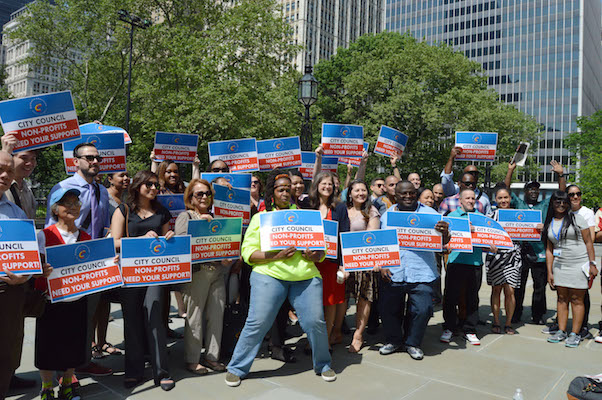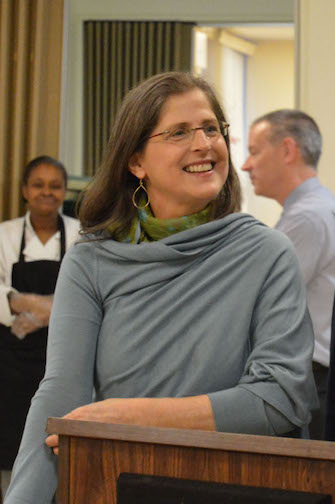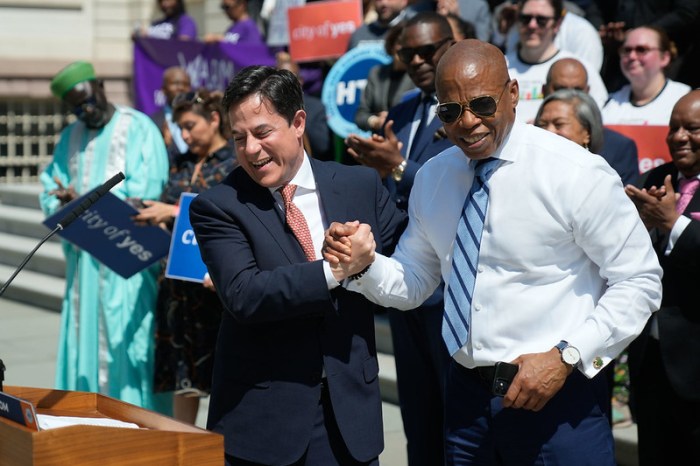
BY JACKSON CHEN | After a concerted drive to reform procedures for the funding of nonprofits fell short in last month’s adoption of the city budget for the fiscal year that began on July 1, Upper West Side Councilmember Helen Rosenthal and Manhattan nonprofits hope to keep the dialogue alive until the Council makes current year budget adjustments in what is known as the November Plan.
At a May rally, nonprofits across the city were led by Rosenthal, the chair of the Council’s Committee on Contracts, in calling for a $25 million increase in the city’s budget for a category of nonprofit contractors’ costs known as “other than personnel services,” or OTPS. That category includes everything from rising rents to client service expenses and supply costs.
Despite support from many councilmembers, the OTPS increase was not included in the $82.1 billion city budget passed in June. Left in their current financial state, many nonprofits explain that the extra money would have helped to create a more sustainable business model and, in turn, better ensure reliable and quality delivery of needed human services.
“If there’s no increase in OTPS, then we’re not able to pay the increase in costs of things like health insurance, home-delivery meals,” Stephan Russo, the executive director for the Goddard Riverside Community Center, said. “We obviously rather have it passed in June so we can start to see the increase in OTPS in July.”
Goddard Riverside, located at Columbus Avenue and 88th Street, offers a broad array of childhood, youth, senior, housing, and legal services.
Representing a wide range of struggling nonprofits, Allison Sesso, the executive director of the Human Services Council, said the City Council’s failure to increase OTPS in the new budget left her frustrated.
“We’ve been very clear that the human services sector’s financials are on the brink,” Sesso said. “This would’ve been a move in the right direction in terms of getting the sector on a better path to financial solvency.”
But she added that the Human Services Council and its allied nonprofits are not deterred from continuing the conversation. Their first opportunity for another shot, according to Sesso, is the November budget modifications.

Alongside the Human Services Council, Rosenthal continues meeting with nonprofits and city agencies to make sure the issue is kept at the fore. In fact, their goals have expanded past the $25 million funding increase.
On top of securing the OTPS funding boost, Rosenthal wants large-scale reform of the way the city interacts with nonprofit contractors. She hopes to expedite the pace at which nonprofits are paid and to set contract rates at levels that more fairly capture the costs they incur in delivering their services. According to the councilmember, nonprofits are sometimes paid six to 18 weeks late and reimbursed for only 80 cents for every dollar of work they do.
“If a senior center is running paycheck by paycheck and if they’re getting paid late,” Rosenthal said. “one could imagine a situation where you say to a worker, we just don’t have the money to pay you this month, but we’re going to be getting a big check next month.”
According to the Human Services Council, many city contracts are underfunded.
For Goddard Riverside, government contracts fail to adequately reimburse overhead costs such as administration, human resources, and IT, Russo said. Overhead costs, he argued, are closer to 15 percent of the cost of delivering services, but contracts typically only cover levels between five and eight percent.
On top of that, Russo said, nonprofits can easily be overwhelmed by the differences in procedures from one city agency to the next.
“The issue is there is not a lot of consistency and no clarity amongst different agencies,” Russo explained. “Each agency seems to have its own rules and regulations. That’s one of the biggest problems you have with overhead and procurement.”
Sesso and Rosenthal remain hopeful that inconsistencies among different agencies can be resolved, noting that the de Blasio administration has been open to dialogue about the need for changes. And they pointed to the mayor’s push for a $15 minimum wage for city and contract employees by 2018.
Rosenthal is planning meetings over the next several months with the Human Services Council, the Mayor’s Office of Contract Services, and the various agencies’ procurement officers to push the dialogue forward.
“We’re going to continue over the summer to help our colleagues see in practice the underfunding,” Rosenthal said. “The nonprofits are reaching out to councilmembers and the administration, talking about the impact of having budget shortfalls while still trying to serve the clients everyone wants them to serve.”
The Human Services Council, meanwhile, has reached out to professional nonprofit consultants, including the nationally recognized Bridgespan Group, to tap their expertise.
Rosenthal envisions New York offering a blueprint to other municipalities trying to reform their nonprofit funding practices.
“I hope New York City can become a model for the state and maybe other states because this problem is happening across the country,” Rosenthal said. “New York City is not alone in this situation.”


































